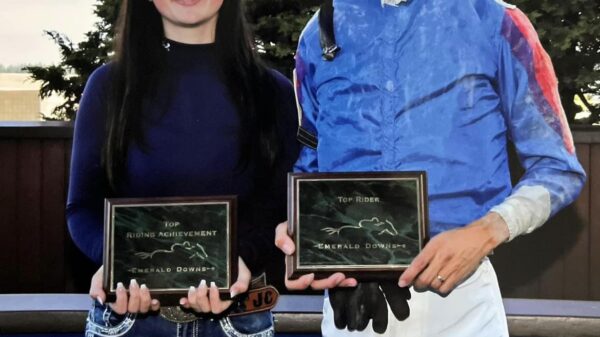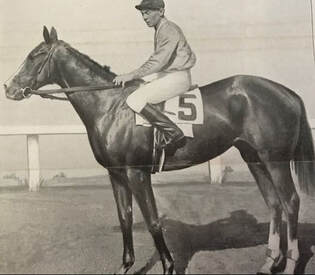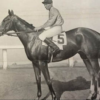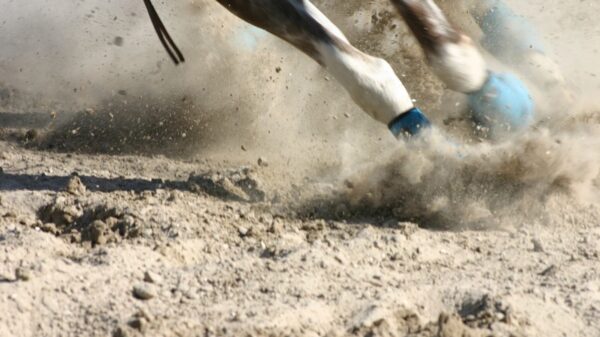
Rinaldo Del Gallo, III
By: Rinaldo Del Gallo, III
In the 2021 Breeders’ Cup Distaff, there was something that told me to bet on a longshot the public was ignoring. You see, a Japanese horse by the name of MARCHE LORRAINE (JPN) b. M, 2016 {7-d} was earning big money in Japan and winning big races. Now the name of the game of horse racing is spotting value—that is the so-called “overlay” where not enough money is laid out on a horse given the horse’s actual chance of winning. (For this reason, I have always thought what we call an “overlay” should be called an “underlay” because not enough money is being laid on the hose, but that’s another whole long story.) It’s all pari-mutuel wagering, or Paris mutuel betting, the literally the object of the bettor is to avoid horses overly bet and find horses that are not getting “the respect” at the windows. Of course, if I could do that all the time and beat the track take (the tracks’ percentage share of all bets) I’d be a billionaire. But let’s face it, it still is a hell of a lot of fun, and that’s why we do it.
Why did I like Marche Lorraine? You see Marche Lorraine was a top-notch horse in the nation of Japan, where being a top-notch horse means something. Japan has some of the richest races in the world. So, I placed a wager on Marche Lorraine who was paying like a lottery ticket in that 2021 Breeder’s Cup Distaff. Ah, I was brilliant. Marche Lorraine was going off at pennies under 50-1 and I, the master handicapper that I am, had her. But being the astute better that I am, I watched the place and show pools, as sometimes horses are under bet there and pay almost as much to place as win. In fact, in some very bizarre situations usually involving a heavy favorite that did not come in the money, the horse will pay more to place or show than to win. And there was Letruska, who was 8-5 and who I picked earlier to win the Apple Blossom the previous year where she beat the favorites. I noticed Letruska was being underbet in the place and show pools, something that often happens to the horses more favored on the board. So, I cancelled my bet on Marche Lorraine and bet on Letruska, the overlooked horse in the place and show pools.
The gates opened, and Marche Lorraine (the horse I cancelled my bet for) became only the second Japanese horse to win a Breeders’ Cup Race. “Letruska, the 8-5 favorite with ties to Mexico, finished 10th among 11 horses.” To this day I need grief counselling for that changed bet and to fix the hole I punched in the wall. What Japanese horse was the first to win a Breeders’ Cup race you may ask? That would be LOVES ONLY YOU (JPN) dkb/br. M, 2016 {20}, a daughter of Deep Impact (the son of Sunday Silence) who won the Breeders’ Cup Filly and Mare Turf on the 20“undercard.”
The 2021 Breeder’s Cup Distaff where greatness alluded me:
Which brings me to Ushba Tesoro. USHBA TESORO again showed the world that the Japanese could produce excellent horses, and he won the 2023 Dubai World Cup. Like Marche Lorraine (a horse named after a patriotic French son), USHBA TESORO (JPN) b. H, 2017 {9-f} was sired by ORFEVRE (JPN) ch. H, 2008 {8-c}, an excellent sire and Japanese Hall of Fame Horse. A great sensation in Japan, Orfevre even boasts taking second in the Prix de l’Arc de Triomphe twice. Orfervre was one of the world’s best racehorses.
Ushba Tesoro wins the Dubai World Cup.
Orfevre’s pedigree is interesting. Orfevre is another sireline grandson of Sunday Silence, this time by Sunday Silence’s son Stay Gold, a winner of the Hong Kong Vase and Dubai Sheema Classic. Horses often have names based on their parents, and sometimes have clever mixtures of the two names. Orfevre is Spanish for “goldsmith,” which is a kind of clever mixing of the sire’s name (Stay Gold) and the dam’s name (Oriental Art.)
But here is what is interesting to me—Orfevre’s damsire. I am in a Facebook group “Descendants of Man O’ War,” a group that hopes the Godolphin Arabian sire line will not die out. In “Descendants of Man O’War,” there was (and still is) a discussion about Tsukitomo, an unraced son of Man O’War that was shipped to Japan in utero (in the womb). Pediqgreequery.com reports Tsukitomo as a “foundation sire of many Japanese thoroughbreds.”
Orfevre has a damsire, MEJIRO MCQUEEN (JPN) gr. H, 1987 {7-c}, who also is in the Japanese Hall of Fame. MEJIRO MCQUEEN’s fourth dam is mare by the name of TOMOE (JPN) ch. M, 1951 {7-c}, who was a solid campaigner and had a record of 48 Starts: 8 – 10 – 9.
Tomoe’s sire was the aforementioned TSUKITOMO (JPN) ch. H, 1932 {19-b}, the unraced son of Man War. TSUKITOMO’s damsire was Sir Martin, a half-brother to Triple Crown winner Sir Barton and arguably a significantly superior sire that I often see in American pedigrees. Other than that race in Canada against Sir Barton to end his career, I don’t believe Man O’ War was on anything other than American soil. But he had that son in Japan.
So TSUKITOMO’s dam ALZADA (USA) ch. M, 1923 {19-b} was sent to Japan and Tusukitomo went in utero. Though (as indicated above) TSUKITOMO was unraced, Alzado was the mother of a Japanese Derby winner, HISATOMO (JPN) b. M, 1934 {19-b}. Note the “M.” Hisatomo was a filly that beat the boys. Alzado had a female family that lasted in Japan’s pedigrees from Hisatomo. TOKAI ROMAN (JPN) b. M, 1981 {19-b} won the Japanese Oaks (Yushun Himba). Tokai Roman’s fifth dam was Hisatoma and 6th dam Alzado. TOKAI TEIO (JPN) b. H, 1988 {19-b} won the Japanese Derby (Tokyo Yushun) and the Japanese 2,000 Guineas (Satsuki Sho) and two other major Group 1 wins in Japan.
There is another interesting thing when you look at ORFEVRE’s pedigree. Check out his dam sire MEJIRO MCQUEEN (JPN) gr. H, 1987 {7-c} pedigree, particularly his 2nd sire MEJIRO ASAMA (JPN) gr. H, 1966 {1-x}, another Teno Sho winner (which is a super big race in Japan.) MEJIRO ASAMA (JPN) gr. H, 1966 {1-x} dam was SWEET SIXTEEN (USA) gr. M, 1951 {1-x} who only bred Japanese horses.
Sweet Sixteen had a sire, FIRST FIDDLE (USA) gr. H, 1939 {A1}, who ran a stunning 95 times! First Fiddle was from the Byerley Turk sire line. Check out who First Fiddle’s second dam was. It was REGRET (USA) ch. M, 1912 {A1}, the first filly to win the Kentucky Derby. Very few horses of today have Regret’s blood—they are out there, but they are exceptional.
JAPANESE HORSES TODAY—SUFFICIENT RESPECT AT THE BETTING WINDOW?
Years ago, in a betting coup I didn’t mess up, I bet on GLORIA DE CAMPEAO (BRZ) b. H, 2003 {3-d} to win, place, and show in the 2010 Dubai World Cup. He too was paying like 50-1—a lot of money for a horse that came in second in the race in 2009. Gloria De Campeao paid $52.40 in United States betting pools to win that Dubai World Cup. I mean, of course, he was not on a roll in between the two races. But 50-1 is a lottery ticket type payout and the horse was second the prior year. So I said to myself, “take a stab at it.”
Well, as fate would have it, the Japanese horses did very well in the Saudi Cup and on Dubai World Cup day this year. I wrote about Japan’s newfound racing hegemony in this publication. So I think the betting public is on to the fact that it is hardly unrealistic that a horse that won the Dubai World Cup earlier this year could win the Breeders’ Cup Classic.
Still, I am hoping for some excessive national chauvinism at the windows. There will be talk of the brilliant campaign of Arcangelo who won the Belmont and Travers and might join the other 13 three-year-old horses to have won the race in its previous 39 runnings. Will the Kentucky Derby winner Mage make a comeback? He was second in the Haskell though he laid an egg in the Travers. What about that up-and-coming Arabian Night (first in the Pacific Classic and third in the Haskell) or Geux Rocket (first in the Haskell and second in the Pacific Classic)? There is a hot set of American three year old horses that is all the buzz in horse racing. What a Pacific Classic finish, reversing the order of the Grade 1 Haskell. What about White Abarrio’s brilliant Whitney and that high speed figure? Which one of these great American horses will come out on top?
In the meantime, that what’s-his-name Japanese horse has hardly been racing, and had a prep race in some obscure race in Japan. What American has ever heard of the “$456,960 Listed Nippon TV Hai at Funabashi Racecourse,” held on a Wednesday? There’s an old saying-out of sight, out of mind. And that was a very out of sight prep race completely unnoticed by American bettors.
Ushba Tesoro wins some race in Japan you never heard of as a prep race for the Breeders’ Cup Classic
Okay, Ushba Tesoro will not be underestimated and therefore underbet the way Marche Lorraine was. No 50-1 payouts here. But it is my hope that the betting American public doesn’t give him the respect he deserves at the betting window because he is some Japanese horse, and Japanese horses almost never win the Breeders’ Cup.
I believe that Ushba Tesoro will be underbet in American betting pools with respect to what are in my estimate a real 3-1 actual chances of winning the Breeders’ Cup Classic. While Japanese horses are getting more and more respected in America, I am hoping that there is just enough of lack of exposure of Ushba Tesoro in American betting markets to make him the “overlay,” or the “value bet”—the horse that will pay more to win than what I believe are his real chances of winning.
It’s not that Ushba Tesoro will be overtly disrespected, after all, he did win the Dubai World Cup. What I hope is that he will sort of be thrown some shade and forgotten in the betting pools and go off at 6-1 or pay even better though I believe his actual chances of winning are 3-1. I do not expect Ushba Tesoro to be disrespected, but I do hope he is unjustifiably overlooked—and that creates value in betting pools.
Given the level of talent in the Breeders’ Cup Classic, there are often many speed horses in the Breeders’ Cup Classic. Perhaps Ushba Tesoro can do it from the back of the pack as he did in the Dubai World Cup.
Unless he goes under 3-1, I recommend an even money “across the board” bet on Ushba Tesoro to win, place, and show (all in the same amounts) in the Breeders’ Cup Classic. So my choice is to bet on that Japanese horse whose name is hard to remember. Perhaps they should have given him a more memorable name, such as GAS STATION SUSHI (USA) b. M, 2015 {14-c}. Hey, Ushba Tesoro will not pay like Gloria De Campeao in the 2010 Dubai World Cup or Marche Lorraine in the 2021 Breeders’ Cup Distaff, but I suspect he will have value as a betting choice because he will be overlooked in comparison to his real chances of winning that race.








